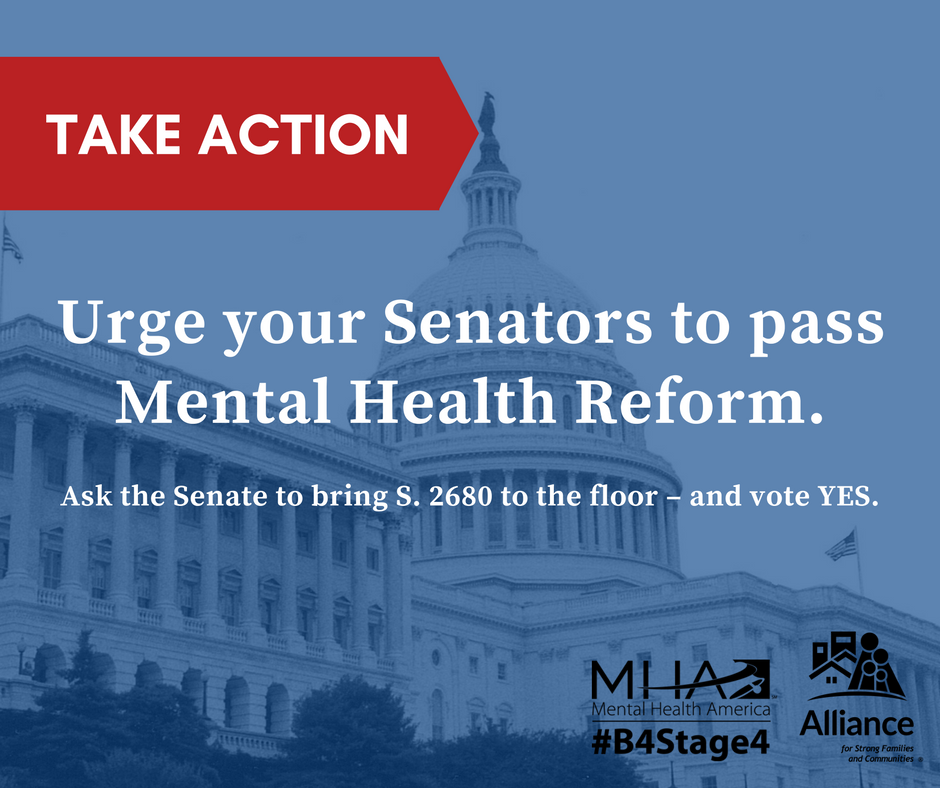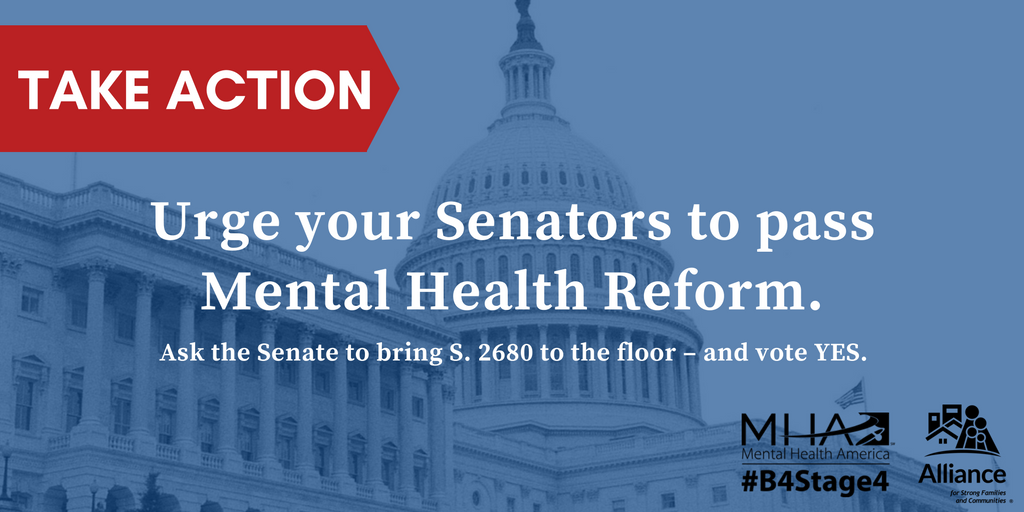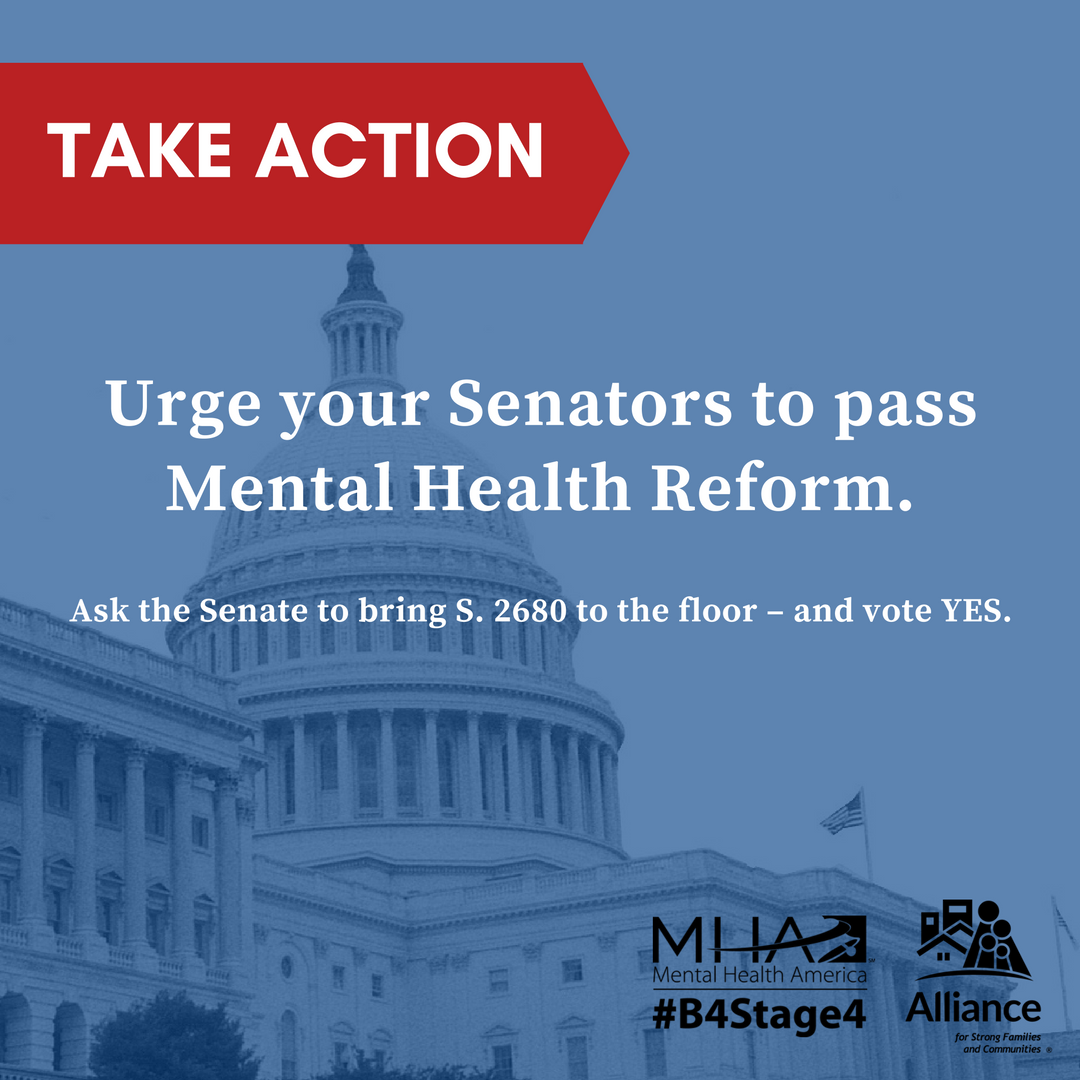December 2016
Thanks to the efforts of mental health advocates from across the nation, H.R. 35, the 21st Century Cures Act, was signed into law by President Obama on December 13, 2016.
MHA commends the entire Congress, but singles out Representative Tim Murphy for his determined and ongoing effort to make this happen – and for his willingness to compromise to bring this to a good conclusion; his House co-sponsor, Representative Eddie Bernice Johnson, for her consistent support for change; Senator Chris Murphy, for his sponsorship of reform efforts and leadership in the Senate in the aftermath of the Sandy Hook tragedy; and Senator Bill Cassidy, his Senate co-sponsor, for his unwavering effort in making this a personal priority as well. The House and Senate leaders of both parties, both at the committee and full chamber levels, have also earned our deep gratitude and praise.
Read MHA's statement on this historic legislation.
November 2016
S. 2680 and H.R. 2646 are important first steps toward strengthening our nation's mental health system - and ones that we must take.
MHA commends all of the members of Congress who have worked so diligently on this issue, and especially applauds Senators Chris Murphy and Bill Cassidy and Representatives Tim Murphy and Eddie Bernice Johnson for their perseverance, along with Senators Alexander and Murray, and Representatives Upton, Pallone, Pitts, and Green and the members of the Senate Committee on Health, Education, Labor and Pensions and the House Committee on Energy and Commerce for their thoughtfulness and leadership in working together on bipartisan reforms.
MHA looks forward to working with the many supportive members of leadership and the entire Congress to pass these bills into law, and continuing to collaborate in coming years to build on this legislative foundation.
MHA applauds S. 2680 and H.R. 2646’s focus on:
- Strengthening the federal role in advancing mental health;
- Authorizing programs to advance screening and early intervention, especially for children to keep them in schools;
- Promoting both evidence-based initiatives and the innovation we need to address mental health concerns before Stage 4;
- Encouraging the involvement of families in the provision of support while maintaining the privacy of individuals;
- Prioritizing community-based services and planning for a reduction in incarceration and homelessness, while increasing supported employment;
- Supporting more meaningful parity guidance and oversight;
- Preserving SAMHSA and its programs, while adding, not subtracting, funding for mental health services; and
- Growing the behavioral health workforce, including people with lived experience who are an essential part of care and support teams that promote recovery.
For more information, please contact Nathaniel Counts, J.D., Director of Policy, at ncounts@mentalhealthamerica.net.
Encourage others to contact their Senators!
Share the messages and images below with your Senators on social media networks:
Facebook:
- The bipartisan #MentalHealthReform Act of 2016 strengthens federal coordination of mental health resources, increases reporting on mental health parity, advances integrated service delivery, supports the mental health workforce, and increases access to mental health services before Stage 4. [@SENATOR’S NAME], urge your colleagues to bring S. 2680 to the floor and vote YES!
- Many individuals with mental illness or substance use conditions are unable to access or receive the appropriate services and supports for these illnesses. We need to reform our mental health system, and S. 2680 is a good place to start. [@SENATOR’S NAME], I urge you to bring the Mental Health Reform Act of 2016 to the floor and to vote YES.

Twitter:
- Dear @[SENATOR’S HANDLE], please urge your colleagues to vote “yes” on #MentalHealthReform and #PassS2680! #B4Stage4
- We need #MentalHealthReform! @[SENATOR’S HANDLE], vote YES on S. 2680 to improve the lives of millions of Americans. #B4Stage4
?
Instagram:
- The bipartisan #MentalHealthReform Act of 2016 strengthens federal coordination of mental health resources, increases reporting on mental health parity, advances integrated service delivery, supports the mental health workforce, and increases access to mental health services before Stage 4. [@SENATOR’S NAME], urge your colleagues to bring S. 2680 to the floor and vote YES!
- Many individuals with mental illness or substance use conditions are unable to access or receive the appropriate services and supports for these illnesses. We need to reform our mental health system, and S. 2680 is a good place to start. [@SENATOR’S NAME], I urge you to bring the Mental Health Reform Act of 2016 to the floor and to vote YES.


